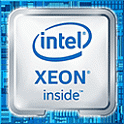 AMD Duron 1600
AMD Duron 1600
 Intel Xeon D-2766NT
Intel Xeon D-2766NT
Comparision AMD Duron 1600 vs Intel Xeon D-2766NT
Grade
Top specs and features
Power Consumption (TDP)
Technological process
Number of transistors
L2 cache size
Number of threads
Description
The AMD Duron 1600 processor runs at There is no data Hz, the other Intel Xeon D-2766NT runs at 2 Hz. AMD Duron 1600 is able to accelerate to 1.6 Hz , and the second to 3.1 Hz. The maximum power consumption for the first processor is 57 W, and for Intel Xeon D-2766NT 97 W.
In terms of architecture, AMD Duron 1600 is built using 130 nm technology. Intel Xeon D-2766NT on the 10 nm architecture.
Relative to processor memory. AMD Duron 1600 can support DDRThere is no data. The maximum supported size is 4 MB. It should be noted that the maximum memory bandwidth is There is no data. The second processor Intel Xeon D-2766NT is capable of supporting DDR4. The throughput is There is no data. And the maximum amount of supported RAM is 1000 MB.
Graphics. AMD Duron 1600 has a graphics engine There is no data. The frequency of which is - There is no data MHz. Intel Xeon D-2766NT received video core There is no data. Here the frequency is There is no data MHz.
How processors perform in benchmarks. In the PassMark benchmark, AMD Duron 1600 scored There is no data. And Intel Xeon D-2766NT scored There is no data points.
Why Intel Xeon D-2766NT is better than AMD Duron 1600
- Power Consumption (TDP) 57 W против 97 W, less by -41%
AMD Duron 1600 vs Intel Xeon D-2766NT: highlights


Performance
Memory specification
Main characteristics
FAQ
Can AMD Duron 1600 and Intel Xeon D-2766NT work in 4K mode?
AMD Duron 1600 - There is no data. Intel Xeon D-2766NT - There is no data.
How many PCIe lanes
AMD Duron 1600 - There is no data. Intel Xeon D-2766NT - 32.
How much RAM does it support?
AMD Duron 1600 supports 4 GB. Intel Xeon D-2766NT supports 1000GB.
How fast are the processors?
AMD Duron 1600 operates on There is no data GHz.
How many cores does the processor have?
AMD Duron 1600 has 1 cores. Intel Xeon D-2766NT has 14 cores.
Do processors support ECC memory?
AMD Duron 1600 - There is no data. Intel Xeon D-2766NT - has.
Does AMD Duron 1600 have embedded graphics?
AMD Duron 1600 - There is no data. Intel Xeon D-2766NT - There is no data
What kind of RAM is supported
AMD Duron 1600 supports DDRThere is no data. Intel Xeon D-2766NT supports DDR4.
What is the socket of the processors?
Using There is no data to set AMD Duron 1600. FCBGA2579 is used to set Intel Xeon D-2766NT.
What architecture do they use?
AMD Duron 1600 is built on the K7 architecture. Intel Xeon D-2766NT is built on the Ice Lake architecture.
Is the AMD Duron 1600 CPU multiplier unlocked?
AMD Duron 1600 - There is no data. Intel Xeon D-2766NT - doesn't have.
How do processors perform in benchmarks?
According to PassMark, AMD Duron 1600 scored There is no data points. Intel Xeon D-2766NT scored There is no data points.
What is the maximum frequency of processors?
AMD Duron 1600 has a maximum frequency of 1.6 Hz. The maximum frequency of Intel Xeon D-2766NT reaches 3.1 Hz.
How much energy do they consume?
The power consumption of AMD Duron 1600 can be up to 57 Watts. Intel Xeon D-2766NT has up to 57 Watts.





















